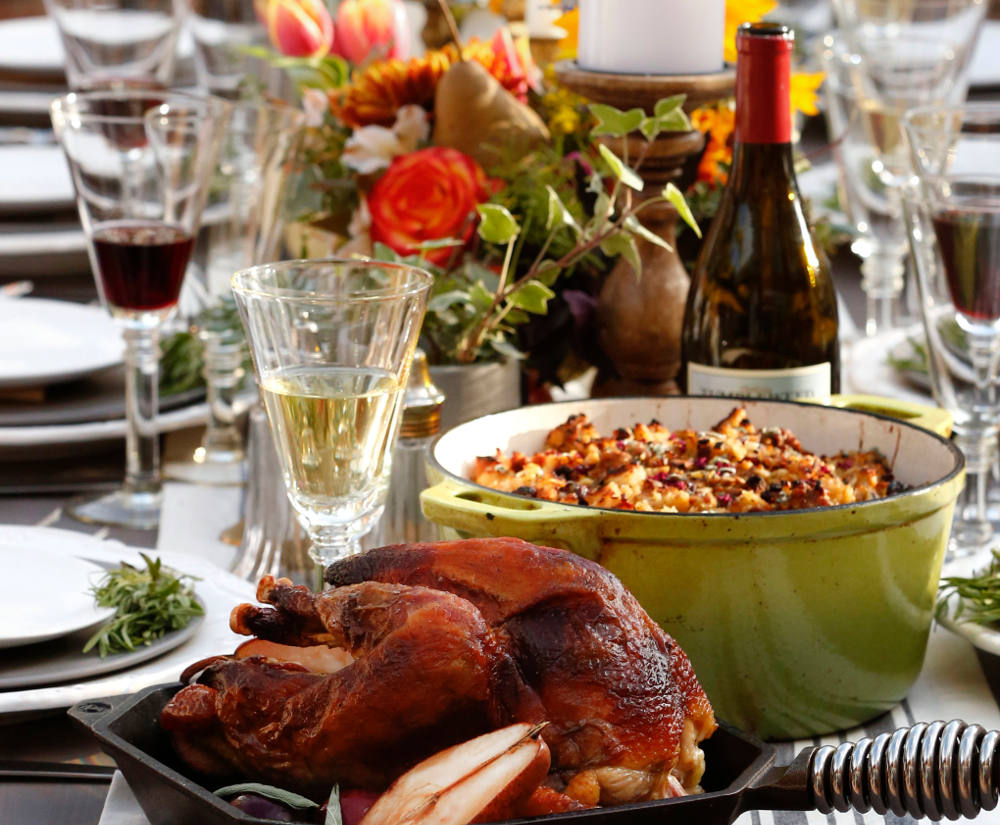
A Thanksgiving Day table features foods from local farms, ranches and purveyors in Arizona. (CNS photo/Nancy Wiechec)
When I first saw this short video, I almost thought of it as cliché.
The video spotlights the role a U.S. Army veteran played in former NFL quarterback Colin Kaepernick’s decision not to sit during the national anthem, in an act of protest against police brutality and racial injustice, but instead to kneel. It tells a good story well and does it in a way that everybody wants to imitate but few do.
We are overwhelmed now with articles about the Thanksgiving table and potential political spats over the stuffing. On behalf of the environment and its integrity and beauty, I am going to abandon my cynicism about the video and give it a shake.
I know it is not easy. Everybody seems to be telling everybody to talk to somebody outside his or her own bubble. We make fun of ourselves for “bubble hopping.” The 111th time you hear that in a day, you either shake your head in political and personal wonderment, or you say that you tried that and it didn’t work.
Long articles tell us how to get along with the Republican or Democrat at your Thanksgiving table. If you are a Democrat, the articles will variously be called “How to Talk to Racist Aunt Betty” or how to not get hooked by “Climate-denier Uncle Herbert.” And if you are a Republican, the stereotypes will talk about “pot-smoking nee’r do well” nephew Sam or “why doesn’t she wear more clothes” niece Susan.
Nevertheless, all bubbles and stereotypes and joking aside, wouldn’t it be great if people who differed could actually talk to each other without accusing each other? Aren’t we all looking for some confirmation and recognition, even a tiny bit of appreciation, for who we are and what we think? How could we possible hope for ecological integrity and environmental beauty without crossing the aisle?
When you analyze the video, you realize that it is actually more strategic than simple-minded. It uses what Jonathan Haidt, a moral political psychologist at New York University, calls an “unusual validator.” Haidt has done a lot of work talking about crossing the aisle and argues that these reliable, if unusual, validators are people with whom we identify enough to hear something new and different. In the video, a football-loving army veteran breaks type, and does so long enough to think out loud about the controversial act of “taking a knee.”
What would be some examples of crossing the aisle on behalf of the environment?
Could we attend meetings where people deny climate change and just listen? Or could we make friends with our aunt, uncle, niece or nephew on a completely different basis than our political affiliations? Or if they do argue that the climate and environment are “just fine,” can we simply respond by “tell me more,” as opposed to arguing their point?
Is that too much to ask?
Advertisement
Personally, I spent a decade or more arguing for women’s reproductive rights with people who profoundly disagreed with me. I was even on Oprah. (I’m bragging before I start my confession.)
I burnt out completely after three or four debates a week. One day I just woke up and cancelled all my panels and appointments. I had become as brittle as I was accusing my opponents of being. I was as absolutist as they. I had lost a kind of fluidity and had something like a moral arthritis. Things that used to bend in me no longer bent. I left the life of the road and quarreling for a living.
Now I prefer to talk to people with whom I adamantly disagree about anything else but our disagreements. I want to listen more than speak. I want to flow, not fight. I don’t want to change people’s minds so much as their hearts.
I want them to recognize and even like me — and I know and feel that once they recognize and kind of like me that they will listen to me, even if I don’t open my mouth about a single non-negotiable principle, like denying the presence of climate change.
Invitation is more useful than pressure. There is enough that most of us agree on that there is no need to pick out the “I’m right and you are wrong” things first, if ever.
That’s why I wrote an appreciative book about Pope Francis. That’s why I like writing for Catholic magazines. That’s why I prefer discussing just about anything over the so-called hot buttons. I like to be an unusual.
This Thanksgiving, the simplest, wisest, most useful and most strategic thing to do when somebody throws political bait into your sweet potato pie is to answer with, “tell me more.”
[Donna Schaper is senior minister of Judson Memorial Church in New York City.]








